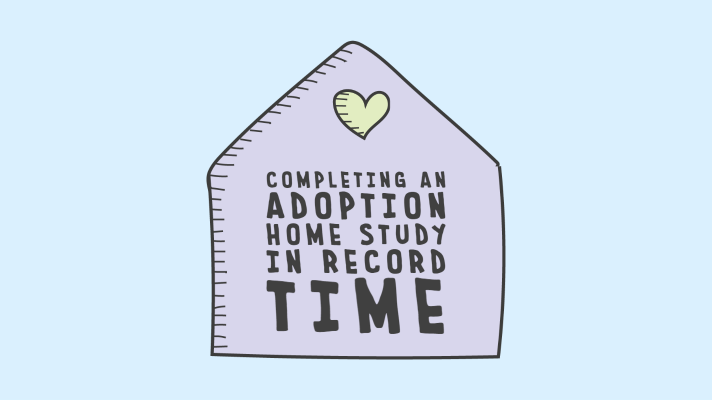When considering different embryo adoption and donation organizations, you will find that some will require an adoption home study or evaluation.
The home study is a written record of your life that typically includes your personal background, family history, health and financial information, and parenting plan. It also includes a home visit and some interviews with a case worker.
The purpose of a home study is not to invade your personal life and try to deter you from pursuing adoption. It is a tool used by the agency or embryo adoption program to verify you are who you say you are and that you will provide a safe and stable home for a prospective child. It is also a tool you have to gather resources and education on embryo adoption and how to parent and accept a child who is not genetically your own.
If you do choose to pursue an organization that requires a home study, many families do wonder how they can complete it as fast as possible. Below are some tips you can use to complete your home study in record time!
1. Find a home study provider that meets your needs
Some embryo adoption programs will provide their own home study service. Others will require you to find our own provider. If you are wanting to pursue a traditional home study (one that can be used for a domestic infant adoption) you will have to use a provider that is located within your state as these home studies are governed under state adoption laws. If you wish to complete an embryo adoption specific home study or evaluation, you can use a provider out-of-state.
Many families determine that even if they use a provider out-of-state for an embryo adoption home study, it is usually more cost effective than using a traditional home study provider closer to home. It is important to do your own research to determine which home study service will meet your needs. We have a list of home study providers by state on our website where you can start your research.
2. Start filling out the relevant paperwork and assembling required documents
Once you have chosen a provider, they will give you a list of documents to collect and paperwork to complete. These generally include (but are not limited to) copies of birth certificates, marriage certificates, driver’s licenses, tax returns, employment verifications, a signed-off physical by a physician, and criminal background checks.
It can be a little overwhelming to see the document checklist at first, but if you take the checklist 2-3 documents at a time, you will find it is a whole lot easier to complete the checklist quickly.
3. Starting thinking about your parenting strategy and motivation to adopt before your interview with the social worker.
Like we stated above, the home study is a very helpful tool for adoptive families to educate themselves on what it means to adopt and parent a child who is not genetically related to them. Throughout the home study, you will be asked a series of questions on your parenting strategy and motivation to adopt embryos. This is a great opportunity to think through what kind of parent you would like to be, what family you would like to have, and to start educating yourself on embryo adoption and donation.
4. Make sure you complete the home safety checklist and guidelines before the home inspection
If you complete a traditional home study, your safety checklist for your home will most likely be longer and stricter that if you are completing an embryo adoption specific home study. For example, for a traditional home study they will want to see that the home if baby proofed at the time of the visit, while an embryo adoption home study will mainly be looking that you have working fire alarms in the home.
Verify with your social worker before the visit on what they are specifically looking for when completing the home inspection.
5. Schedule a home visit and interviews
After you have collected the required paperwork, completed your education, and completed the home safety checklist, it is time to schedule the home visit. Along with the home inspection, you will also be interviewing with the social worker and speaking one-on-one with them. They will ask you questions pertaining to your childhood, past, motivation to adopt, or other questions pertaining to you they will need to address in the home study.
This is also a wonderful time to ask the social worker any adoption related questions you may have about the adoption, education, or the home study process.
Once you are done with the home visit, the social worker’s final home study report will be drawn up and sent to their supervisor for review. Once it is approved, you will go over it with the social worker, as well.
Following these basic tips, you can complete your home study in record time, which gets you moving forward in the embryo adoption or donation process much faster! To learn more about embryo donation or adoption, visit EmbryoAdoption.org.


Recent Comments